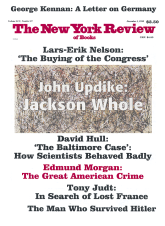In response to:
The New New Math from the September 24, 1998 issue
To the Editors:
I am the author of the case of “Sandra,” one of the cases of fifth-grade teachers Martin Gardner discusses and quotes from in “The New New Math” [NYR, September 24]. Gardner draws on his knowledge of Sandra and the other three teachers from two sources. One source is Bernadette Kelly’s article (Effective School Practices, Spring 1994) and the other is a summary article based on the four cases (Elementary School Journal, Volume 93, 1992). The original four cases of Sandra, Valerie, Jim, and Karen, which were written and published as four individual articles (Elementary School Journal, Volume 93, 1992), are not referenced by Gardner yet he criticizes the authors and texts of these cases. For example, I am criticized by Gardner for saying Sandra was an “exemplary teacher.” In the text of my case, I accurately reported from my sources that “Sandra likes to teach mathematics and is identified by both district personnel and a university-based staff developer as someone who teaches in ways consistent with the Framework. She is, from their perspective, an exemplary teacher within her school district” (p. 155). The label, “exemplary,” was one given to Sandra by sources I interviewed, not one I attributed to her. Gardner’s other criticisms of my work are based on statements from my case pulled out of context and similar to those used by Kelly (Effective School Practices, Spring 1994).
As a qualitative educational researcher, it is my responsibility to report what I see and to try to understand what I see from the participant’s point of view. Sandra’s practice seemed outrageous and perplexing to me as an observer. However, in writing the case, my aim was to try to explain what I observed. Gardner states, “What is deplorable, as Bernadette Kelly’s article points out, is not so much that the case studies revealed the incompetence of two teachers,…as the authors’ praise of Sandra and Valerie for finding ways to get their pupils working joyfully on problems.” What Gardner and Kelly interpret as praise is my effort as a researcher not to bash a teacher and to try to understand what I observed from Sandra’s perspective. In the text of my case, I state, “My observations in Sandra’s classroom illustrate what can happen when a teacher who has the best of intentions tries to teach a concept that he or she does not understand. Although subject matter knowledge alone is insufficient for teachers to teach for understanding, it is nonetheless crucial. Sandra’s case dramatizes the role of subject matter knowledge—its need becomes evident through the consequences of its absence” (p. 161). The title of my case, “Who is Minding the Mathematics Content? A Case Study of a Fifth Grade Teacher,” also represents my concern over attention to subject matter in elementary mathematics instruction. Had Gardner read the original text of my case of Sandra, I think he would have seen that he and I agree on the need for elementary teachers to understand the mathematics they are aiming to teach.
Ruth M. Heaton, Ph.D.
Assistant Professor
University of Nebraska-Lincoln
Lincoln, Nebraska
Martin Gardner replies:
It is true that my comments on Ruth Heaton’s article about Sandra were based entirely on Bernadette Kelly’s paper. I am pleased that Ms. Heaton is given this opportunity to clarify her opinion of Sandra’s failure to understand the math she was supposed to teach.
This Issue
December 3, 1998



